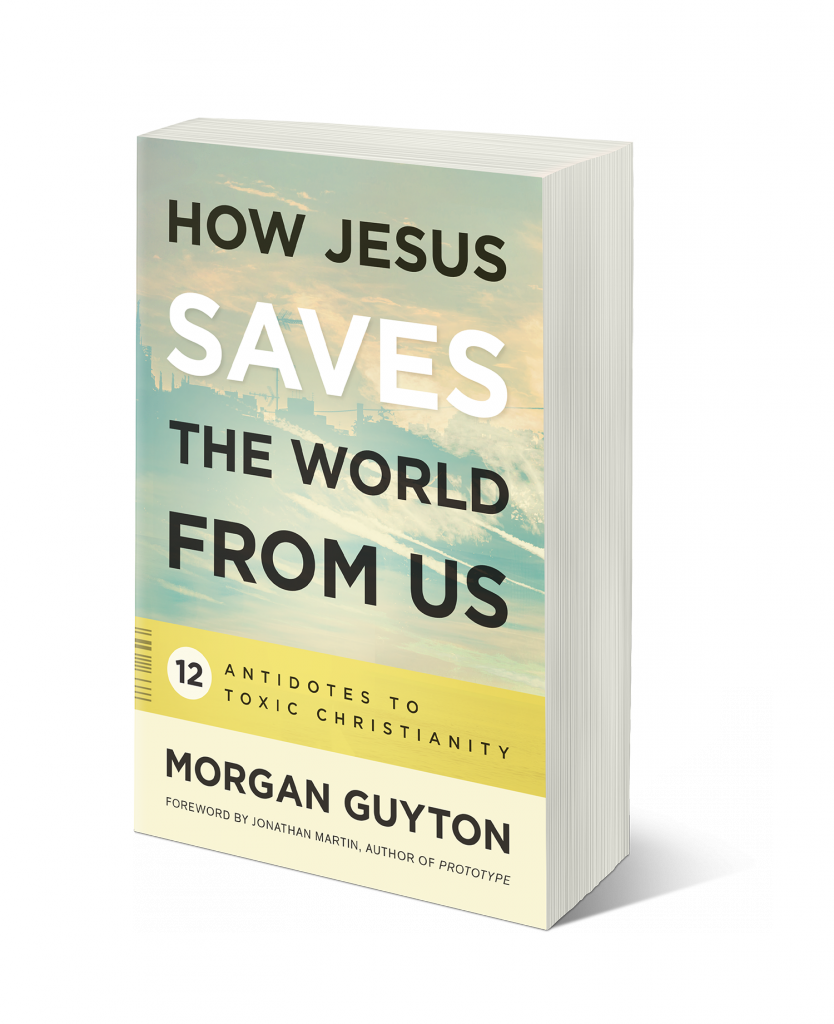Book Review: How Jesus Saves the World From Us
Morgan Guyton is on a journey.
He has left behind Christian fundamentalism with its debilitating toxins and has trekked his way through the expanse of God’s wide-open grace. His book How Jesus Saves the World From Us serves, in part, as a chronicle of that journey. He does not presume to have arrived, as many of his humble, self-deprecating stories reveal. He is following Jesus with sincerity and intent and has shared with us what he has gained from his experience. Parts of what he has learned on his journey resonates with my own story. In these sections, I found myself applauding Guyton. In other parts of the book, I found myself scratching my head as I failed, at times, to connect the dots as he offers a better way to live the Christian life than the narrow confines of ugly fundamentalism. A few times I found his anecdotes and illustrations distasteful. In these sections I felt my attention distracted from the richness of the solutions he was offering. In the end, much of the valuable insights in this book are overshadowed by a dualistic, polemical tone that is a toxin of its own kind. It seems this book is an attempt to be prophetic in the Hebrew tradition of prophets. In Prophetic Imagination, Walter Brueggemann makes the case that Hebrew prophets both energize and criticize the people of Israel through their acts of prophecy. In the case of How Jesus Saves the Word From Us, Guyton seems to be far too critical and far less energizing in most chapters.
Strengths of the Book
Let me back up a few steps and draw out some of the strengths of this book. First, Guyton writes from a Christ-centered and Church-centered perspective. This is a book for the church, for those who are serious about following Jesus and working to support the work of Jesus in building healthy churches. One of the strongest chapters in the book is “Servanthood, Not Leadership.” Guyton writes:
“When Christian leaders structure their churches around their need to feel important, they are creating cancer in the body of Christ. What would our Christian communities look like if our leaders truly sought to define themselves primarily as servants?”
He rightly identifies the rampant self-ambition in church leadership and offers a Jesus-model of leading through servanthood. Other chapters have equally strong solutions which will promote church health.
Second, he consistently draws upon love as the supreme ethic whereby we can identify and remove the toxins in the church. For example, in the chapter entitled “Honor, Not Terror,” he describes the fear of the Lord not in terms being scared of God, but honoring God and honoring the God-image in other people. He uses the story of Huck Finn who goes against his cultural and religious upbringing to show kindness to his friend Jim, the slave, even if such kindness will “send him to hell.” Guyton writes:
“Fearing God is not being afraid of what God will do to me, but afraid of what I might do to Jesus.”
This helpful corrective rightly classifies the fear of the Lord as a kind careful respect, locating Jesus in and among the suffering and the oppressed.
Third, the chapters in this book are written from the vantage point of a life lived in honest pursuit of Christ and his kingdom. Guyton has no pretense in telling his stories, stories of pain and stories of transformation. Never is this transparency more clear than in the story he tells about encountering poverty while on vacation in Mexico. A young five-year old girl in a dirty dress is begging Guyton to buy a doll from her. This encounter wrecked him. This moment was when he claims he “got saved.” Stories like these are raw and honest and lend credibility to many of the solutions Guyton offers the church.
Weaknesses of the Book
For all of it’s strengths, I found How Jesus Saves the World From Us riddled with weaknesses which honestly surprised me. First, the book is trapped within a dualist, “us vs. them” paradigm. The overarching theme throughout the book, as captured in the title, is that the church, primarily the evangelical American church, is filled with toxic practices and beliefs hindering the brightness and beauty of the gospel. Guyton argues for solutions to these toxins as way for God to save the world from us and our unhealthy ways. Sadly this dualistic theme (the world against us) undercuts the many helpful solutions Guyton offers because it pits the world against the church, or at least the unhealthy church. The classic Wesleyan vision is of God at work among his people for the sake of the world, and not, as Guyton positions things: God saving the world from his people. This dualism, the world against the people of God, filters into a number of issues dividing progressive and conservative evangelicals.
For example, in the chapter on “Outsiders, Not Insiders” Guyton argues that Jesus was not a religious “insider,” but that he associated with the “outsiders” (i.e. sinners). He creates a false dichotomy here in that Jesus was both a religious Jew who came as a fulfillment of the Law to be Israel’s Messiah (as an insider) and he was fulfilling Israel’s vocation to bring the light of salvation to the sinful Gentile world (as an outsider). Guyton does rightly advocate for the church to embrace the outsider, but he does so from a dualistic point of view. When speaking of the church’s response to the LGBT community, a sensitive and delicate topic among progressives and conservatives, he creates an unhelpful divide. He confesses that he has “almost given up on trying to argue (that being “queer” isn’t sinful), because it seems like so many insider Christians are so invested in their anti-LGBTQ stance that it’s become their litmus test for Christian identity.” The language here sadly reveals the antagonism between progressives and conservatives causing ongoing disintegration in the conversation in the church on how to best love our LGBT neighbors. If I stand with the great tradition of the church in defining marriage as a sacred, male plus female relationship, which I do, then am I anti-LGBT and against their community? He has already defined Jesus in this chapter as an outsider, which implies I am an insider not only opposing a community of people for their sexual orientation, but I am opposing Jesus. This kind of unhelpful polemic only creates greater divide in the body of Christ. I too do not want to argue with gay-affirming evangelicals, because arguments and debates seldom produce the love Jesus commands of us.
Second, I found some of Guyton’s anecdotes and illustrations cynical and at times distasteful. I sense that Guyton is attempting to be provocative, but I felt he pushed some metaphors too far. He mentions yelling at his kids, teenage boys who are “horny and incapable of controlling themselves,” a girl who was molested by Bill Gothard, and worship through fasting as an “erotic experience,” an illustration to which he adds the disclaimer: “as icky as that may sound.” Yes it was icky. He should have left that one out. These are examples in just the first three chapters. I found these and other anecdotes distracting me from some of the great points he was making. For example the worship through fasting description is in the context of a larger metaphor for hearts that need to be emptied of clutter more than they need to be cleaned. And while I think this metaphor is a false dichotomy (I think we need both a decluttered heart and a clean heart), it is a helpful way for us to think through the difficult subject of sanctification.
How Jesus Saves the Word From Us is a mixed bag. There is so much I loved about this book and so much I disliked. In the end I think there are better, more constructive, ways to root out the pathogens in the modern American evangelical church. The ancient Church has given us ways through prayer and conversation to root out those things hindering the work of the gospel. It begins with prayer, contemplative prayer, rising above the harsh dualisms of “good guys” and “bad guys,” “right Christians” and “wrong Christians.” Guyton loves the church and I appreciate his work in calling us to greater faithfulness to the mission of Jesus, but solutions tainted with dualisms fail to bring about their intended cure.


